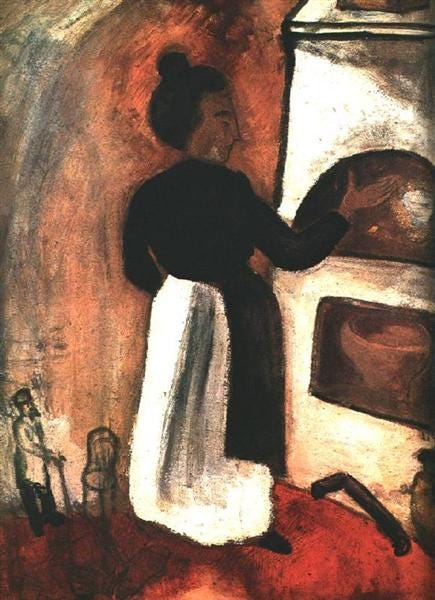Morning and Evening, Pt. XIX
The latest installment in an ongoing narrative, told week by week
Previously: Morning and Evening, Parts I, II, III, IV, V, VI, VII, VIII, IX, X, XI, XII, XIII, XIV, XV, XVI, XVII and XVIII
A week before his bar-mitzvah Yossel’s mother began the baking: honey-flodn and strudels, kugels, poppy dumplings. The celebration was to be held after the morning service, in the house of Khaimke the lacemaker and his wife Rochel: they had been kind enough to offer their table to him, and the community, in honor of their new yeshiva-boy, was to provide vodka, herring, and cholnt. But his mother would not be outdone even by the communal purse in this celebration, and so the house was full of the smells of warm dough and cinnamon. There was always a tray of something round and sweet resting on top of their broad wood stove, and the rooms were stiflingly hot at all hours. For two days he hardly saw his mother’s face: in the morning she was turned away from him, coiling dough into sweet serpents, and in the evening she was gone, and the house was dark and warm as a mouth.
On the third day before his bar-mitzvah he came home with his heavy book in hand—his lips moving erratically, forming the shapes of the words of his portion. She was gone and the room was still and silent, the wood-stove still filled with burning coals. On the table there was a glass jar, left open: buckwheat honey, with white flakes of comb still floating in the thick dark fluid. His mouth began to water; the cookies and cakes and kugels in their clay pots were resting in a cooling heap in the dugout by the back door, not to be touched on pain of wrath, but this honey, open in the cooling room, would not be missed. Emboldened, he took up a spoon and advanced.
The first spoonful slid down his throat with unutterable sweetness. The darkness of it, the buckwheat flowers he could taste along his tongue, filled him with a kind of wild pleasure. Such sweetness was rare in Hanachiv: he could count on the fingers of his hand the festive days on which dough baked with honey was customary; and though in Podolia they baked their gefilte-fish with sugar, here it was sour as a pickle, served with stinging horseradish, and the stews were served with salty scraps of meat. And his mother hardly ever bought honey, or even the new sacks of beetroot sugar sold for pennies by Layzer the grocer, shipped by the sugar magnates from Brody. She baked her black bread with rye flour, yeast, and little else. He wanted now to take that sweetness, rare and full, for his own. He took spoonful after spoonful, chewing the comb until it was tasteless wax, until the taste of honey was cloying and long after—and then he looked and saw the jar was nearly half-empty. Putting the spoon down beside it, he backed away, wrapping his sticky hands around his heavy book. His tongue was thick and heavy against his teeth, and his cheeks flushed red with embarrassment. Taking his book, he went to his bed, closed the door, and chanted his portion again and again until sleep came over him. Even then, the taste of honey lingered in his mouth.
When he woke his throat was burning. Each swallow was thick and painful. When he took a breath, the air rasped painfully down to his lungs, and he coughed violently. His sheets and blankets were sodden with sweat, and his limbs trembled; even in the warm house, where the stove was already crackling, he felt frozen through, as cold as he had ever been. He could remember the day when, as a child of six, he had gotten lost on his way back from heder and waited out a storm, trembling between two birches, until the snow came up to his neck. But now he was colder still—cold to his bones. He drew a slow breath and coughed; he drew the blankets tighter around his body and coughed harder. Each spasm went through his throat like a knife, sparks seared his skin and burned him.
Keep reading with a 7-day free trial
Subscribe to The Sword and the Sandwich to keep reading this post and get 7 days of free access to the full post archives.





